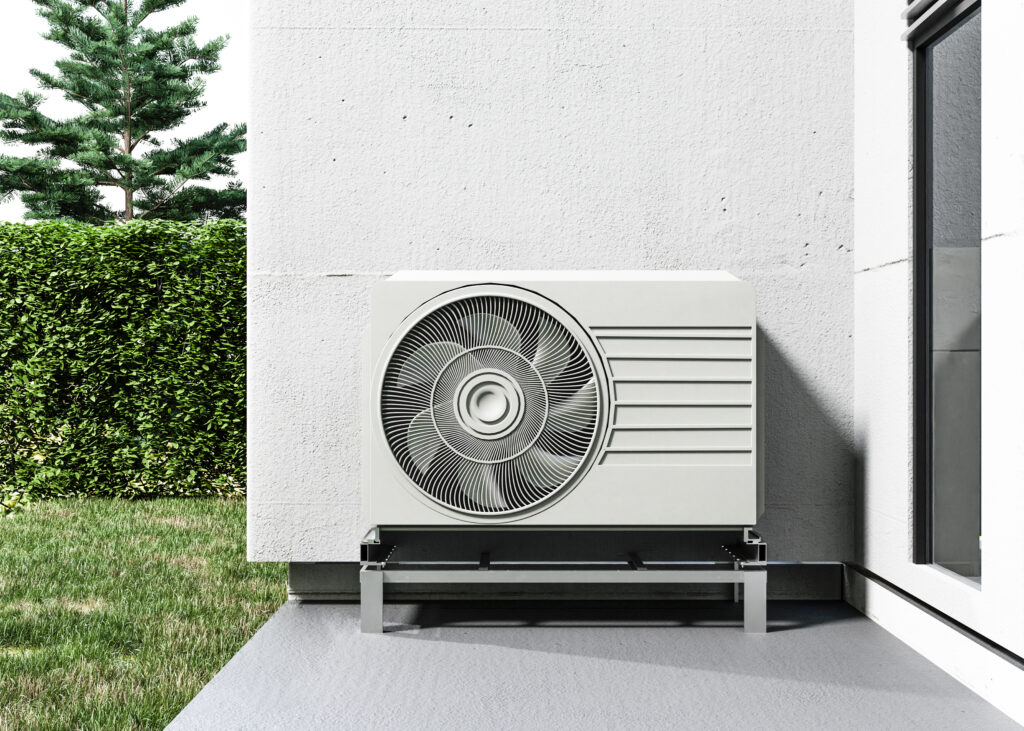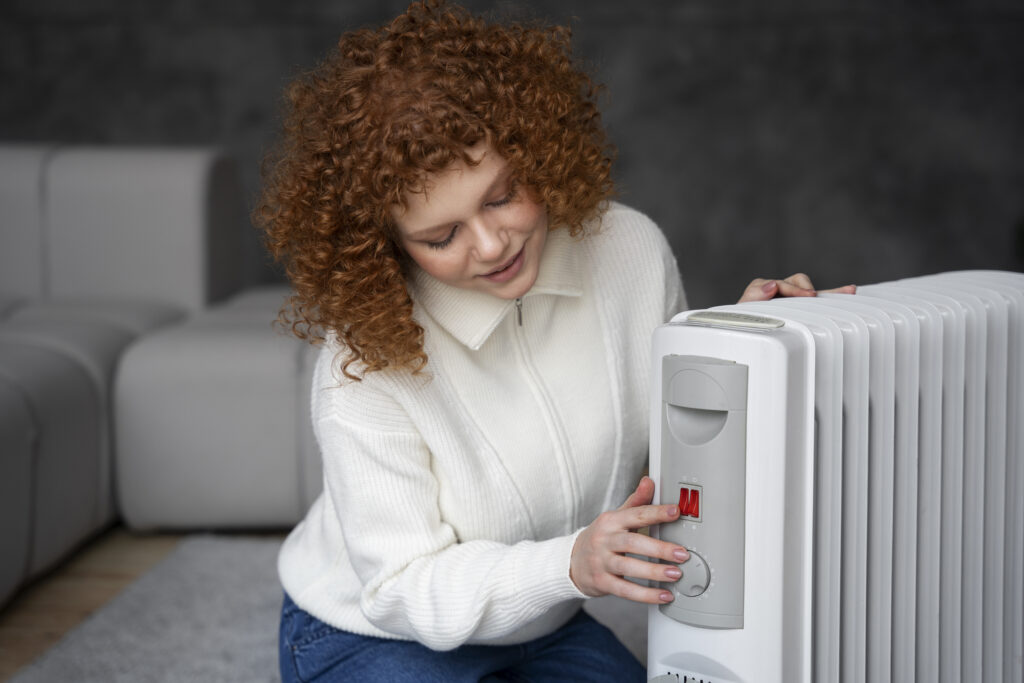Heat Pump

A heat pump is a highly efficient heating and cooling system that transfers heat from one place to another using electricity. Unlike traditional heating systems that generate heat by burning fuel, a heat pump moves heat from the outside air, ground, or water into your home during cold months.
In warmer months, it reverses the process, removing heat from your home and releasing it outside, providing cooling. Heat pumps can significantly reduce energy consumption and lower utility bills, making them an eco-friendly and cost-effective solution for year-round temperature control.
A heat pump through Cozyfy offers an efficient and eco-friendly solution for heating and cooling your home, with the added benefit of government-backed support. Cozyfy specializes in helping eligible homeowners and tenants access heat pumps through initiatives like the ECO4 scheme, which can significantly reduce or even eliminate the upfront installation costs.
They offer expert guidance, handle the entire process—from the initial free home assessment to professional installation—and ensure that the most suitable heat pump is chosen for your home. By switching to a heat pump through Cozyfy, you can enjoy lower energy bills, reduced carbon emissions, and year-round comfort, all while contributing to a more sustainable future. Cozyfy makes upgrading to modern heating technology easy and affordable, providing long-term savings and peace of mind.

Types of Heat Pumps
Heat pumps come in various types, each designed to transfer heat using different sources. The three main types of heat pumps are air-source heat pumps, ground-source heat pumps, and water-source heat pumps. While all heat pumps operate on the same basic principle of heat transfer, they differ in how and from where they draw heat, making them suitable for different environments and property types.
Air-Source Heat Pumps (ASHP)
Air-source heat pumps are the most common and widely used type. These systems absorb heat from the outside air, even in colder temperatures, and transfer it indoors to warm your home. They can also reverse the process during the summer months to cool your home. Air-source heat pumps are relatively easy to install compared to other types, making them more affordable upfront. They are ideal for homes in moderate climates where extreme cold is rare. However, their efficiency can decrease in freezing conditions, which is something to consider in colder regions.
Pros:
- Easy and less expensive to install.
- Can provide both heating and cooling.
- Suitable for most properties with limited space.
Cons:
- Efficiency drops in very cold weather.
- Requires an outdoor unit, which can produce noise.
Ground-Source Heat Pumps (GSHP)
Ground-source heat pumps, also known as geothermal heat pumps, use heat from the ground to warm your home. Since the temperature underground remains relatively constant throughout the year, these systems are highly efficient regardless of the weather. Ground-source heat pumps involve installing a network of pipes, either horizontally or vertically, into the ground to extract heat. While these systems have a higher upfront cost due to the complexity of installation, they offer superior efficiency and long-term savings on energy bills. Ground-source heat pumps are best suited for homes with enough land space for pipe installation and are ideal for regions with more extreme temperature fluctuations.
Pros:
- Extremely efficient and reliable, even in extreme cold.
- Low operating costs after installation.
- Long lifespan and minimal maintenance.
Cons:
- High upfront installation cost.
- Requires significant land space for pipe installation.
Water-Source Heat Pumps
Water-source heat pumps work similarly to ground-source systems but extract heat from a nearby water source, such as a lake, pond, or river. They are highly efficient since water bodies tend to retain heat better than air or soil. However, these systems are less common due to the need for a nearby water source and specific conditions that allow for installation. Water-source heat pumps are a great option if your property is located near a body of water, but the installation process can be more complex and expensive.
Pros:
- Highly efficient and stable temperature regulation.
- Uses a renewable heat source (water).
Cons:
- Requires proximity to a suitable water source.
- Installation can be complicated and costly.
How Does a Heat Pump Work Under ECO4?
A heat pump works under the ECO4 scheme by offering an energy-efficient heating and cooling solution for eligible households, reducing both energy consumption and carbon emissions. Through ECO4, households with poor energy performance and those on qualifying benefits can upgrade to a heat pump at no or minimal cost. Heat pumps work by transferring heat rather than generating it.
In winter, the system extracts heat from the outside air or ground, even in colder temperatures, and moves it indoors to warm your home. In summer, the process reverses, and the heat pump expels heat from your home, cooling it efficiently. This dual functionality, combined with the ECO4 funding, makes heat pumps a cost-effective and environmentally friendly alternative to traditional heating systems. By replacing inefficient boilers, the ECO4 scheme ensures households not only save money on energy bills but also contribute to the UK’s goals of reducing carbon emissions.

Pros of heat pump
The pros of heat pumps make them an attractive option for modern heating and cooling solutions. One of the biggest advantages is their energy efficiency. Heat pumps transfer heat rather than generate it, which can significantly reduce energy usage and lower utility bills by up to 40-60% compared to traditional systems. They are also eco-friendly, as they rely on electricity rather than burning fossil fuels like gas or oil, leading to reduced carbon emissions and a smaller environmental footprint.
Another benefit is their dual functionality, as heat pumps provide both heating in the winter and cooling in the summer, eliminating the need for separate systems. With low maintenance requirements and a lifespan of up to 20 years, heat pumps offer long-term savings and convenience. Additionally, they are safer than combustion-based heating systems, with no risk of carbon monoxide leaks, making them a healthier option for households.
Cons of heat pump
While heat pumps offer many benefits, there are several cons to consider. One of the main drawbacks is the high upfront cost, as heat pumps can be expensive to install, especially ground-source models, which can cost between £5,000 and £10,000 or more. The installation process can also be complex, requiring professional expertise, and may involve significant disruption, especially for ground-source systems that need space for underground pipes.
Another con is that heat pumps can struggle in extreme cold. Air-source heat pumps may become less efficient in freezing temperatures, which could require a backup heating system in very cold climates. Additionally, heat pumps tend to be most effective in well-insulated homes, meaning older homes may need insulation upgrades, further adding to costs. Finally, the outdoor unit of an air-source heat pump can be noisy, which might be a concern for some homeowners, especially if installed near bedrooms or neighboring properties.
Conclusion
In conclusion, heat pumps offer a highly efficient, eco-friendly, and versatile solution for both heating and cooling needs. Their ability to reduce energy consumption and lower carbon emissions makes them a smart choice for environmentally conscious homeowners.
Although the upfront installation cost can be higher, the long-term savings on energy bills, minimal maintenance, and increased comfort make heat pumps a worthwhile investment. As technology advances and government schemes like ECO4 provide financial support, heat pumps are becoming an accessible and sustainable option for many households.
FAQs
A heat pump is an energy-efficient system that heats and cools your home by transferring heat. In the winter, it extracts heat from the outside air or ground and brings it indoors. In the summer, it works in reverse, removing heat from inside and releasing it outside, providing cooling.
There are two main types:
Air-source heat pumps (ASHPs):
Extract heat from the air outside.
Ground-source heat pumps (GSHPs):
Extract heat from the ground. Air-source is more common due to easier installation, while ground-source systems are more efficient but costlier.
The cost varies depending on the type of heat pump and the size of your home. An air-source heat pump can cost between £5,000 and £10,000, while ground-source heat pumps can range from £10,000 to £20,000. However, schemes like ECO4 can help cover these costs.
Yes, heat pumps are highly efficient because they transfer heat rather than generate it. They can produce 3-4 units of heat for every unit of electricity used, making them much more efficient than traditional heating systems like gas boilers.
Yes, heat pumps can both heat and cool your home. In the summer, they reverse their function to remove heat from your home, making them a versatile year-round solution.
Yes, modern heat pumps can work efficiently even in cold climates. Air-source heat pumps are designed to extract heat from the air even in freezing temperatures, though their efficiency may decrease in extreme cold. In very cold areas, a backup heating system may be needed.
Heat pumps require minimal maintenance. Regular cleaning of filters, checking for any blockages in the system, and ensuring proper airflow are usually enough. Professional servicing is recommended once a year to ensure optimal performance.
With proper maintenance, a heat pump can last between 15 to 20 years, making it a long-term investment for your home.
Yes, you may be eligible for government grants like the ECO4 scheme, which can cover part or all of the installation costs for heat pumps if you meet specific criteria such as low income or receiving certain benefits.
Yes, heat pumps are environmentally friendly because they use electricity to transfer heat rather than burning fossil fuels. This reduces your carbon footprint, especially if your electricity comes from renewable sources.